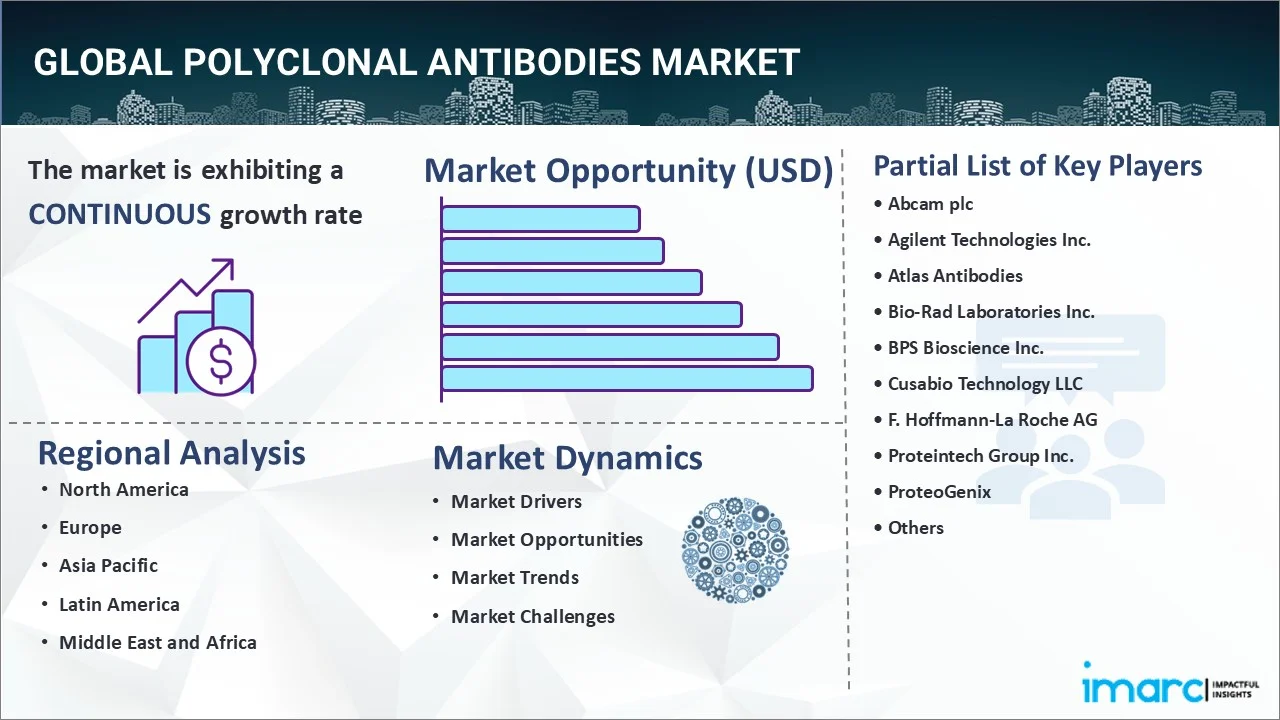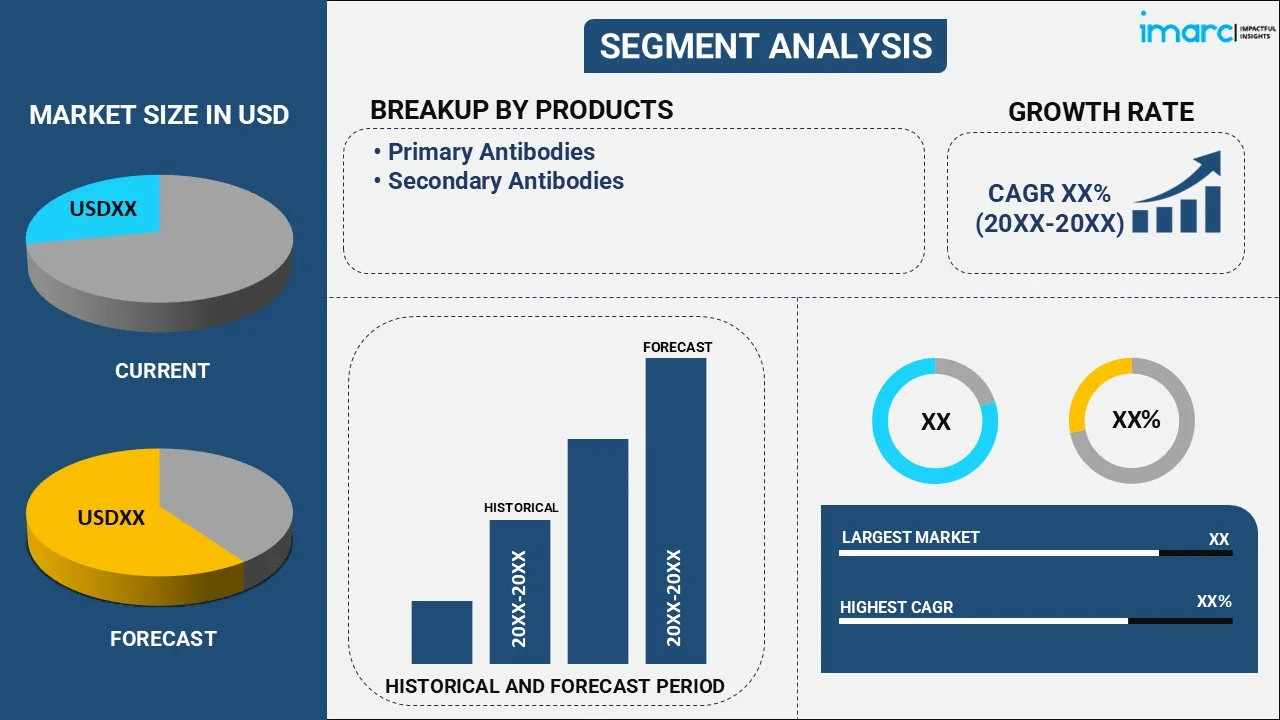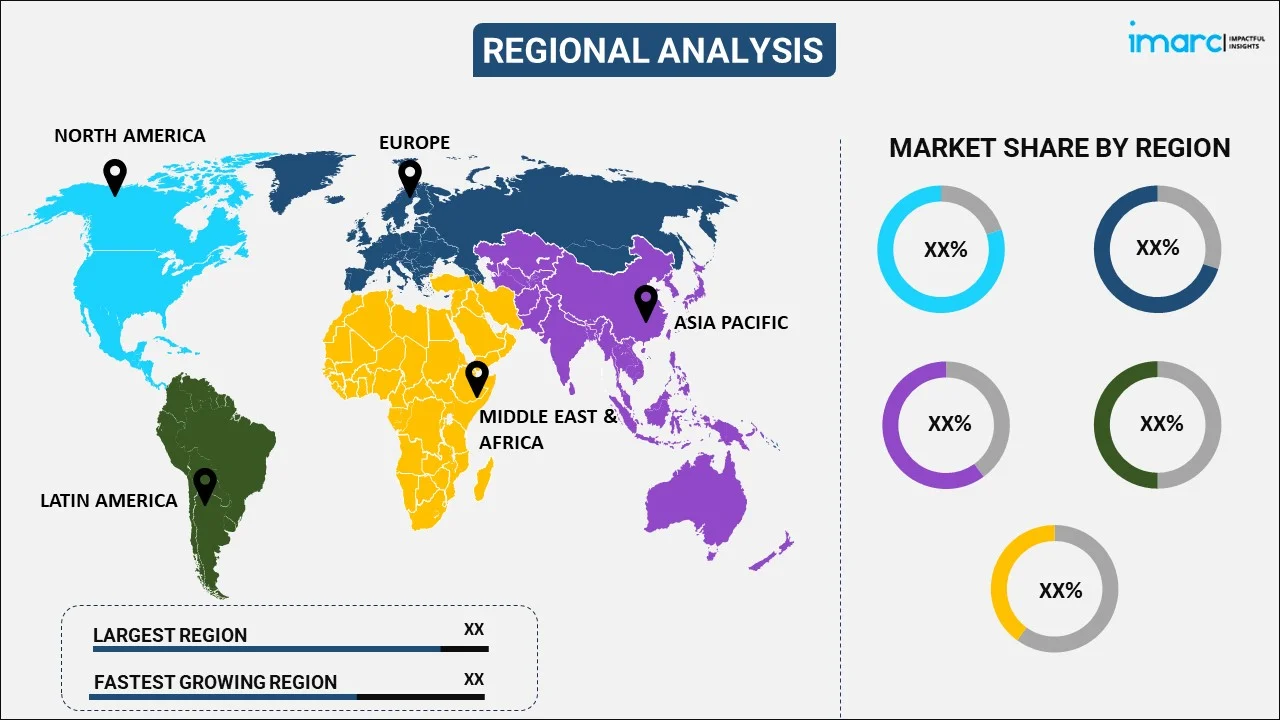
Polyclonal Antibodies Market Report by Product (Primary Antibodies, Secondary Antibodies), Source (Rabbits, Goats, Sheep, Mouse, and Others), Application (Biomedical Research, Diagnostics), End User (Pharmaceutical and Biotechnology Companies, Hospitals and Diagnostic Centers, Academic and Research Centers), and Region 2026-2034
Polyclonal Antibodies Market Size & Share:
The global polyclonal antibodies market size reached USD 1.44 Billion in 2025. Looking forward, IMARC Group expects the market to reach USD 2.14 Billion by 2034, exhibiting a growth rate (CAGR) of 4.45% during 2026-2034. The increasing prevalence of infectious diseases, expanding healthcare industry, and the rising neurobiology and stem cell research are key factors driving the market.
|
Report Attribute
|
Key Statistics
|
|---|---|
|
Base Year
|
2025
|
|
Forecast Years
|
2026-2034
|
|
Historical Years
|
2020-2025
|
| Market Size in 2025 | USD 1.44 Billion |
| Market Forecast in 2034 | USD 2.14 Billion |
| Market Growth Rate (2026-2034) | 4.45% |
Polyclonal antibodies are a diverse group of antibodies produced by different B cells in response to an antigenic stimulus. They are derived from an organism's immune response, typically an animal, and can recognize multiple epitopes on the antigen. They are widely used in various research and diagnostic applications due to their versatility and specificity. Their production involves immunizing an animal, such as a rabbit, mouse, or goat, with the target antigen. The animal's immune system responds to the antigen by producing a heterogeneous population of B cells, each capable of generating a unique antibody. After a sufficient immune response has been generated, serum containing the polyclonal antibodies is collected from the animal. It can recognize multiple epitopes on the target antigen. This broad binding capacity enhances their sensitivity and specificity, making them suitable for detecting various antigens. Polyclonal antibodies are particularly useful in cases where the antigen is highly variable or complex, such as viral infections or cancer biomarkers. They are also relatively easy to produce and cost-effective compared to monoclonal antibodies.

To get more information on this market, Request Sample
Polyclonal Antibodies Market Trends:
The global market is primarily driven by the increasing product demand in research laboratories and diagnostic applications. In line with this, the rising demand for advanced diagnostic methods and the need for reliable research tools are significantly contributing to the market growth. Furthermore, polyclonal antibodies are employed in immunoassays, immunohistochemistry, flow cytometry, and other techniques, driving demand in these sectors. Polyclonal antibodies are also increasingly being explored for therapeutic purposes, particularly in treating cancer and infectious diseases. They offer several advantages, such as a broad target range, enhanced binding affinity, and potential synergy through multiple mechanisms of action. The development of novel polyclonal antibody-based therapeutics is stimulating the market. Moreover, the advances in antibody production technologies have facilitated the generation of high-quality polyclonal antibodies with improved specificity and efficacy. Techniques such as recombinant DNA technology, hybridoma technology, and phage display have enhanced the efficiency and reproducibility of polyclonal antibody production, thus driving market expansion. Besides, the heavy investments in research and development activities from academic institutions and pharmaceutical companies are catalyzing the market. The growing prevalence of chronic diseases, including cancer, autoimmune disorders, and cardiovascular diseases, is propelling the market. The biopharmaceutical industry is witnessing remarkable growth in recent years, focusing on developing novel biologics and personalized medicines. Polyclonal antibodies are essential for biopharmaceutical research, drug discovery, and development. The expanding biopharmaceutical industry is further fueling the demand for polyclonal antibodies, thus supporting the market growth.
Polyclonal Antibodies Market Segmentation:
IMARC Group provides an analysis of the key trends in each segment of the global polyclonal antibodies market report, along with forecasts at the global, regional and country levels from 2026-2034. Our report has categorized the market based on product, source, application and end user.
Product Insights:

To get detailed segment analysis of this market, Request Sample
- Primary Antibodies
- Secondary Antibodies
The report has provided a detailed breakup and analysis of the polyclonal antibodies market based on the product. This includes primary antibodies and secondary antibodies. According to the report, secondary antibodies represented the largest segment.
Source Insights:
- Rabbits
- Goats
- Sheep
- Mouse
- Others
A detailed breakup and analysis of the polyclonal antibodies market based on the source have also been provided in the report. This includes rabbits, goats, sheep, mouse, and others. According to the report, rabbits accounted for the largest market share.
Application Insights:
- Biomedical Research
- Diagnostics
A detailed breakup and analysis of the polyclonal antibodies market based on the application have also been provided in the report. This includes biomedical research and diagnostics. According to the report, diagnostics represented the largest segment.
End User Insights:
- Pharmaceutical and Biotechnology Companies
- Hospitals and Diagnostic Centers
- Academic and Research Centers
A detailed breakup and analysis of the polyclonal antibodies market based on the end user have also been provided in the report. This includes pharmaceutical and biotechnology companies, hospitals and diagnostic centers, and academic and research centers. According to the report, hospitals and diagnostic centers accounted for the largest market share.
Regional Insights:

To get more information on the regional analysis of this market, Request Sample
- North America
- United States
- Canada
- Europe
- Germany
- France
- United Kingdom
- Italy
- Spain
- Others
- Asia Pacific
- China
- Japan
- India
- South Korea
- Australia
- Indonesia
- Others
- Latin America
- Brazil
- Mexico
- Others
- Middle East and Africa
The report has also provided a comprehensive analysis of all the major regional markets, which include North America (the United States and Canada); Europe (Germany, France, the United Kingdom, Italy, Spain, and others); Asia Pacific (China, Japan, India, South Korea, Australia, Indonesia, and others); Latin America (Brazil, Mexico, and others); and the Middle East and Africa. According to the report, North America was the largest market for polyclonal antibodies. Some of the factors driving the North America polyclonal antibodies market included the augmenting demand for advanced diagnostic methods, the increasing need for reliable research tools, the rising neurobiology and stem cell research, etc.
Competitive Landscape:
The report has also provided a comprehensive analysis of the competitive landscape in the global polyclonal antibodies market. Competitive analysis such as market structure, market share by key players, player positioning, top winning strategies, competitive dashboard, and company evaluation quadrant has been covered in the report. Also, detailed profiles of all major companies have been provided. Some of the companies covered include Abcam plc, Agilent Technologies Inc., Atlas Antibodies, Bio-Rad Laboratories Inc., BPS Bioscience Inc., Cusabio Technology LLC, F. Hoffmann-La Roche AG, Proteintech Group Inc., ProteoGenix, R&D Systems Inc., Rockland Immunochemicals Inc., Thermo Fisher Scientific Inc., etc. Kindly note that this only represents a partial list of companies, and the complete list has been provided in the report.
Report Coverage:
| Report Features | Details |
|---|---|
| Base Year of the Analysis | 2025 |
| Historical Period | 2020-2025 |
| Forecast Period | 2026-2034 |
| Units | Billion USD |
| Scope of the Report | Exploration of Historical and Forecast Trends, Industry Catalysts and Challenges, Segment-Wise Historical and Predictive Market Assessment:
|
| Products Covered | Primary Antibodies, Secondary Antibodies |
| Sources Covered | Rabbits, Goats, Sheep, Mouse, Others |
| Applications Covered | Biomedical Research, Diagnostics |
| End Users Covered | Pharmaceutical and Biotechnology Companies, Hospitals and Diagnostic Centers, Academic and Research Centers |
| Regions Covered | Asia Pacific, Europe, North America, Latin America, Middle East and Africa |
| Countries Covered | United States, Canada, Germany, France, United Kingdom, Italy, Spain, China, Japan, India, South Korea, Australia, Indonesia, Brazil, Mexico |
| Companies Covered | Abcam plc, Agilent Technologies Inc., Atlas Antibodies, Bio-Rad Laboratories Inc., BPS Bioscience Inc., Cusabio Technology LLC, F. Hoffmann-La Roche AG, Proteintech Group Inc., ProteoGenix, R&D Systems Inc., Rockland Immunochemicals Inc., Thermo Fisher Scientific Inc., etc. |
| Customization Scope | 10% Free Customization |
| Post-Sale Analyst Support | 10-12 Weeks |
| Delivery Format | PDF and Excel through Email (We can also provide the editable version of the report in PPT/Word format on special request) |
Key Benefits for Stakeholders:
- IMARC’s report offers a comprehensive quantitative analysis of various market segments, historical and current market trends, market forecasts, and dynamics of the polyclonal antibodies market from 2020-2034.
- The research study provides the latest information on the market drivers, challenges, and opportunities in the global polyclonal antibodies market.
- The study maps the leading, as well as the fastest-growing, regional markets. It further enables stakeholders to identify the key country-level markets within each region.
- Porter's five forces analysis assists stakeholders in assessing the impact of new entrants, competitive rivalry, supplier power, buyer power, and the threat of substitution. It helps stakeholders to analyze the level of competition within the polyclonal antibodies industry and its attractiveness.
- Competitive landscape allows stakeholders to understand their competitive environment and provides an insight into the current positions of key players in the market.
Key Questions Answered in This Report
The polyclonal antibodies market was valued at USD 1.44 Billion in 2025.
The polyclonal antibodies market is projected to exhibit a CAGR of 4.45% during 2026-2034, reaching a value of USD 2.14 Billion by 2034.
The polyclonal antibodies market is driven by growing demand in diagnostics, research, and therapeutic applications. Key factors include increasing prevalence of chronic diseases, rising investment in biotechnology and life sciences, need for cost-effective and versatile antibody solutions, and expanding use in drug development, immunoassays, and biomedical research.
North America currently dominates the polyclonal antibodies market driven by advanced biotechnology and pharmaceutical industries, high research and development investment, and strong healthcare infrastructure. Increasing prevalence of chronic diseases, widespread adoption of immunoassays, and growing demand for diagnostic and therapeutic applications further reinforce the region’s market leadership.
Some of the major players in the polyclonal antibodies market include Abcam plc, Agilent Technologies Inc., Atlas Antibodies, Bio-Rad Laboratories Inc., BPS Bioscience Inc., Cusabio Technology LLC, F. Hoffmann-La Roche AG, Proteintech Group Inc., ProteoGenix, R&D Systems Inc., Rockland Immunochemicals Inc., Thermo Fisher Scientific Inc., etc.
Need more help?
- Speak to our experienced analysts for insights on the current market scenarios.
- Include additional segments and countries to customize the report as per your requirement.
- Gain an unparalleled competitive advantage in your domain by understanding how to utilize the report and positively impacting your operations and revenue.
- For further assistance, please connect with our analysts.
 Request Customization
Request Customization
 Speak to an Analyst
Speak to an Analyst
 Request Brochure
Request Brochure
 Inquire Before Buying
Inquire Before Buying




.webp)




.webp)












